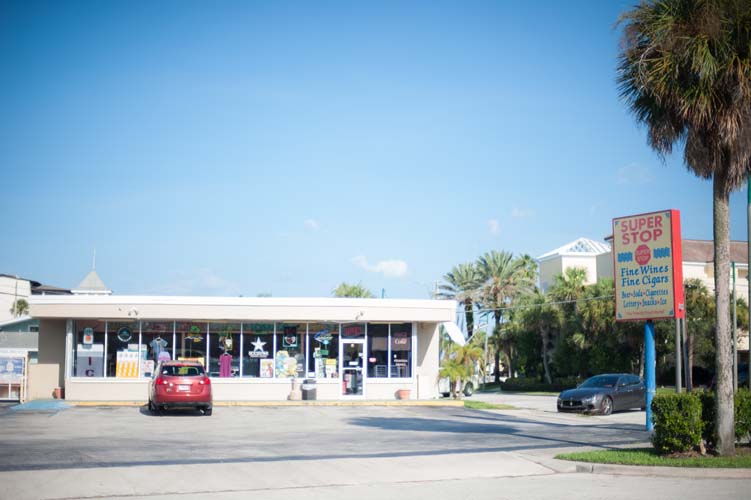
The way Barbara Thompson sees it – and she has seen a lot in her 53 years in Vero Beach – this is the city’s last, best chance to buy the land it needs to solve the long-standing parking problem in the Central Beach business district.
She might be right.
Even City Manager Jim O’Connor admitted “there are limited options over there,” especially land-purchase options the city can afford or is willing to pay for.
That’s why, Thompson said, she has offered to sell to the city – “at a reduced price” – the property currently occupied by the Super Stop convenience store on Cardinal Drive, immediately north of Camelia Lane and across the street from The Tides restaurant.
She said she told city officials she will take $500,000 off her initial asking price of $2.9 million, merely because she has lived here since 1965, loves Vero Beach and, at age 78, wants to help the community “before I leave.”
If the city isn’t interested, however, she said she’ll probably accept an offer she has received from an out-of-town buyer and sell the property, which she and a business partner have owned since May 2016, before the end of the year.
She has given the City Council until the end of the month to decide if it wants the property to build a parking garage.
“I bought the Grind & Grape property in 1978, when it was the Vero Beach Motel, and even back then people were talking about parking,” Thompson said. “But no one has ever really done anything to solve the problem, and they’re still just doing a Band-Aid job.
“The City Council says it wants to address the beachside parking situation, and this is their chance,” she added. “I’m not saying the city should build a parking garage right now, but at least they’d have the land to do it.”
Rumblings about the city possibly buying the Super Stop property to build a parking garage began in January, when Thompson and her co-owner, James Swainston of Nolensville, Tenn., put the .39-acre parcel on the market.
Thompson said she and Swainston planned to build a boutique hotel on the property – something the city endorsed – but he suffered a heart attack shortly after they purchased the land and they abandoned the project.
O’Connor said he has had “four or five conversations” with Thompson this year, but quickly added that the city never seriously considered buying the land – and not only because the price was too high.
“Let’s say the city bought the property at her price,” O’Connor began. “We’d have to demolish the existing building and resurface the lot. Even then, we might be able to get 40 spaces there. Now divide $2.4 million by 40, and you’ll get the cost of each space.”
That’s $60,000 per spot.
And if the city wanted to build a parking garage there?
“We’d have to put another $4 million into it to go two stories up, which would give us three levels, each with 40 spaces, if you use the roof, too,” O’Connor said. “So now you’re looking at $7 million – and that doesn’t include the long-term maintenance costs of operating a structure on the beach.”
At $7 million for 120 spaces, the cost per space would be $58,333.
Seven-million dollars is a sizable investment, O’Connor said, especially for a project that only partially addresses the problem.
“First, the property is on Cardinal Drive, which doesn’t have a parking problem,” O’Connor said. “Second, it’s on the south end of the business district. How many people do you think would park there and walk to Bobby’s or the Vero Beach Hotel, or all those shops north of Beachland Boulevard?
“I’m not sure they’d park there and walk to Mulligan’s,” he added. “A lot of the people who go to Ocean Drive want to park close to where they’re going, so we’d be spending several million dollars on a parking garage that at least some people won’t use.”
O’Connor said the city would be supportive if the Oceanside Business Association retailers wanted to raise money for a parking garage, but he warned that the benefits probably aren’t worth the cost.
“Even if we had all the money we needed to build a garage,” he said, “I don’t know that we can accommodate everybody.”
In fact, O’Connor said the city created a “parking fund” in 1988, when some beachside business owners contributed various sums to address the area’s parking needs and, if necessary, purchase property for a lot.
The fund contained just over $192,000 when it was dissolved in 2004 and the money was returned.
“Apparently,” O’Connor said, “they never found a way to use it.”
Or, as Thompson put it: “They had all that money for all that time and didn’t buy anything.”
The city isn’t going to buy now, either – not from Thompson, not at $2.4 million, not for a parking garage.
“The city says it doesn’t have the money, but what about all those tax revenues from the Ocean Drive hotels?” Thompson said. “There’s the money the city is getting from the sale of the downtown post office. Now they’re talking about selling the old Dodgertown golf-course property.
“It seems like the barrier island gets very little of that money.”
O’Connor said the city “devotes a lot of time and resources” to the island, but the City Council has expressed no interest in spending $2.4 million to buy the Super Stop property.
He did find her price curious, though.
“It just happens to be the same price the city has been offered for the Dodgertown golf-course property,” O’Connor said. “Just a coincidence, I guess.”
Not that it matters.
Right now, it’s hard to see the city spending that kind of money on a beachside parking problem that a garage might not solve.



